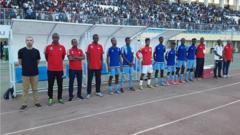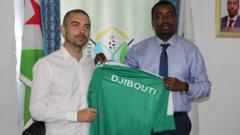French coach Julien Mette is under no illusions about the task ahead of him in charge of Djibouti but is taking inspiration from the recent feats of Madagascar.
When the 37-year-old took over in February he became only the second European coach to lead the East Africans, after a ten-month reign of English-born Michael Gibson in 2016.
Mette arrived with the side ranked 197 in the world on the back of spells with Congolese clubs Tongo and AS Otoho.
He wasted little time in his new environment, coaching Djibouti's under -17 team, organizing a two-month camp for the senior team and scouting players in the domestic league.
"It is the second division of African football," says Mette.
"Djiboutian clubs often don't participate in Caf (continental) competitions, be it the Confederation Cup or the Champions League.
"You need a big club, like a locomotive, that can target the qualifiers of the Champions League to help the domestic league.
"In the Djiboutian league the players can make ten or fifteen mistakes and you won't concede, because the opponent is not that strong. By playing only in the local league, there is lack of rigor."
Mette focused on the tactical development of his players when Djibouti returned to the international fray after a two-year absence.
Despite a welcome 1-0 win over neighbours Somalia in July, Mette lamented the tangible inexperience of his players.
"There were a lot of emotions - the packed stadium, the national anthem, the patriotic aspect" recalls Mette.
"The team had a lot of difficulty to play their game. They had their hearts in their mouths. Even the veterans felt pressure. You learn to deal with your emotions playing international matches."
Inspired by Madagacar
Mette, like his players, is a novice at the international level, but to address his own shortcomings he liaised with former Kenya coach Sébastien Migné and Raja Casablanca coach Patrice Carteron, listening to their experiences and exchanging ideas.
Another compatriot Nicolas Dupuis however offers the biggest source of inspiration for Mette and Djibouti after he guided debutants Madagascar to the last sixteen of the 2019 Africa Cup of Nations in Egypt.
"Madagascar was an outsider of which everyone thought that they would be the whipping boys at the Africa Cup of Nations," says Mette.
"They were the least storied team in the tournament. Repeat what they did ? It is an objective, but in the long term.
"In terms of population Madagascar is huge in comparison to Djibouti and they have got a lot expatriates as well.
"Djibouti played with zero expatriates, so it will take a lot of things to get the same conditions as Madagascar, but what they achieved is something that we have followed and it is an example for us."
Despite facing numerous problems scouring the Djiboutian diaspora in Europe the coach has built a network of scouts, organized a trial in Paris and even appealed on French radio to any players with Djiboutian roots.
He has also had some success by convincing Warsama Hassan from Belgian side FC Seraing to swap national allegiances to Djibouti, after playing for Belgium's under-15 and under-16 sides.
"Hassan was a bit easier, because he has a past with Racing Genk, one of the biggest Belgian clubs," explains Mette.
"It was easy to track him down, but it is very difficult to find players. There was no one who busied himself with researching players.
"That is the first difficulty: sitting in front of a computer to find players from Djibouti in Europe.
"The second difficulty is that these players play at amateur level. Thirdly, certain Djiboutians left the country in the 80's and the 90's, took Somalian nationality, so you can't find them."
The road ahead
Hassan has been included in a 25-man squad that will play Eswatini in September in the first round of African qualifying for the 2022 World Cup in Qatar.
Three years ago, Eswatini defeated the Shoremen of the Red Sea at the same stage of qualifying 8-1 on aggregate to record their biggest-ever win, but Mette downplays the significance of that result.
"I'd almost like to say that it is not important," says Mette.
"It is important to motivate the players, because it is going hurt their pride. Djibouti's supporters remember that result very well, so we have some history to rectify.
"Before talking about qualification against Eswatini it is about reproducing what we did in Ethiopia (in African Nations Championship - CHAN - qualifiers) so that our fans at home in Djibouti can see what their players are capable of, so improving strongly.
"We lost, so there are things to improve. It is about winning of course, but what do you do to win? You improve."
In August, Djibouti were eliminated by Ethiopia 5-3 on aggregate in the first round of qualifying for the 2020 CHAN.
No matter the outcome of the two-legged Eswatini encounter, Djibouti will have competitive games in October against The Gambia in the preliminary round of 2021 Africa Cup of Nations qualifiers.
"It will be the biggest challenge," acknowledges Mette.
"We will be two matches away from participating in the group phase of the Africa Cup of Nations qualifiers. The characteristics of the Gambian players are not favourable for us and I also fear the return leg in Gambia. To get into the group phase that would be superb for us, a big goal."
When Mette signed in East Africa, the Djiboutian Football Federation, the FDF, did not demand that the Frenchman qualify the team for one of the major continental tournaments, but Mette wants to ensure the long-term professionalization and playing style of the team.
"The only thing that I was asked is that we wouldn't be ridiculed anymore - that we don't suffer heavy defeats anymore," says Mette.
"It is firstly a phase of reconstruction, which is gonna take almost two years. The long-term challenge is to implement an identity and structure that lasts even after my departure."









0 Comments